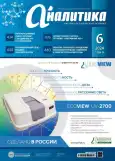Instrumental Solutions for Elemental Analysis Based on Plasma Spectrometry
- Authors: Kamenshchikov A.E.1, Rodchenkova V.V.2
-
Affiliations:
- LABTEST Company
- Moscow Aviation Institute
- Issue: Vol 14, No 6 (2024)
- Pages: 458-465
- Section: Analytical Methods and Instruments
- URL: https://journals.eco-vector.com/2227-572X/article/view/642666
- DOI: https://doi.org/10.22184/2227-572X.2024.14.6.458.464
- ID: 642666
Cite item
Abstract
Elemental analysis is in demand in almost all industries: metallurgy, ecology, agriculture, pharmaceuticals, forensics, chemistry, microelectronics, oil and food industries, aircraft materials production, etc. Among other analytical methods, inductively coupled plasma spectrometry (ICP) occupies a significant place. The article discusses the features of methods of mass spectrometry and optical emission spectrometry with inductively coupled plasma. Both methods effectively complement each other. The capabilities, advantages and technical characteristics of the advanced models of ICP-MS spectrometers (SUPEC 7000) and ICP-AES (EXPEC 6500) are described in detail.
Full Text
About the authors
Alexander E. Kamenshchikov
LABTEST Company
Author for correspondence.
Email: info@lab-test.ru
Director
Russian Federation, MoscowVeronika V. Rodchenkova
Moscow Aviation Institute
Email: info@lab-test.ru
PhD, Associate Professor, Department of Physics
Russian Federation, MoscowReferences
- Пупышев А. А., Данилова Д. А. Использование атомно-эмиссионной спектрометрии с индуктивно связанной плазмой для анализа материалов и продуктов черной металлургии. Аналитика и контроль. 2007;11(2–3):131–181. Pupyshev A. A., Danilova D. A The use of Inductively Coupled Plasma Atomic Emission Spectrometry for Analysis of Materials and Ferrous Metallurgy Products. Analytics and control. 2007;11(2–3):131–181 (in Russ.).
- Остапенко Д. С Применение методов плазменной спектрометрии в силикатном анализе. Вестник ДВО РАН. 2016;5:139–144. Ostapenko D. S. Application of plasma spectrometry in silicate analysis. Vestnik of Far Eastern Branch of Russian Academy of Sciences. 2016;5:139–144.
Supplementary files













